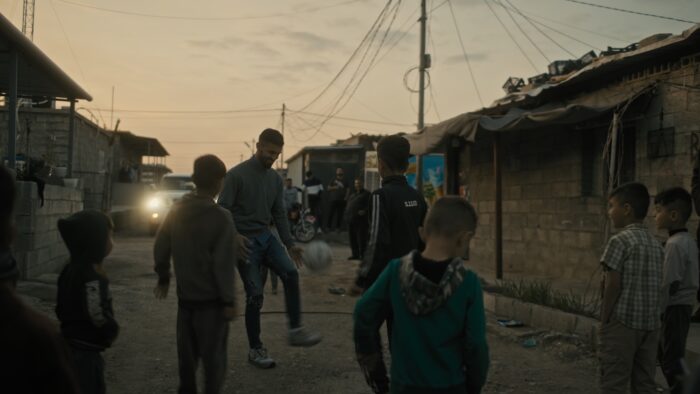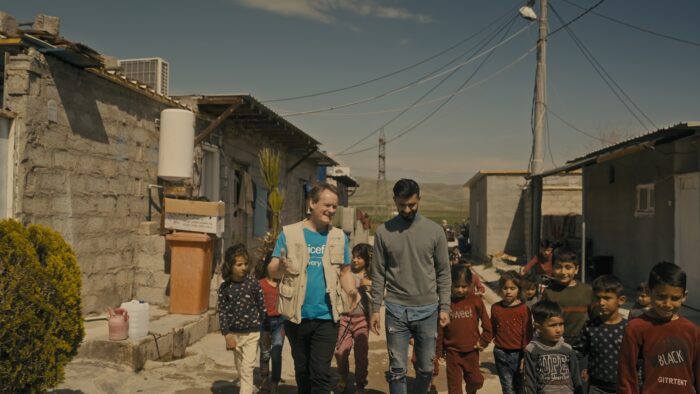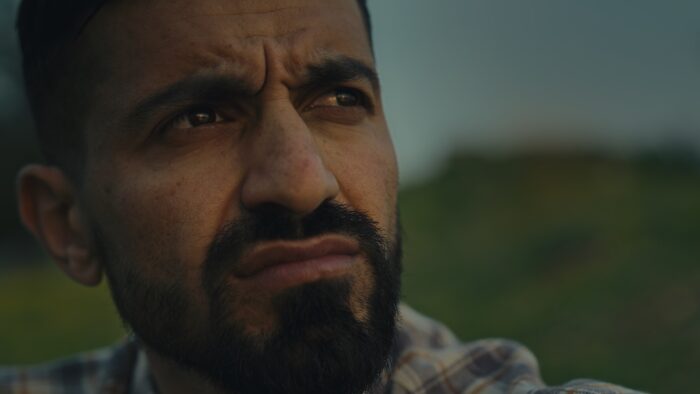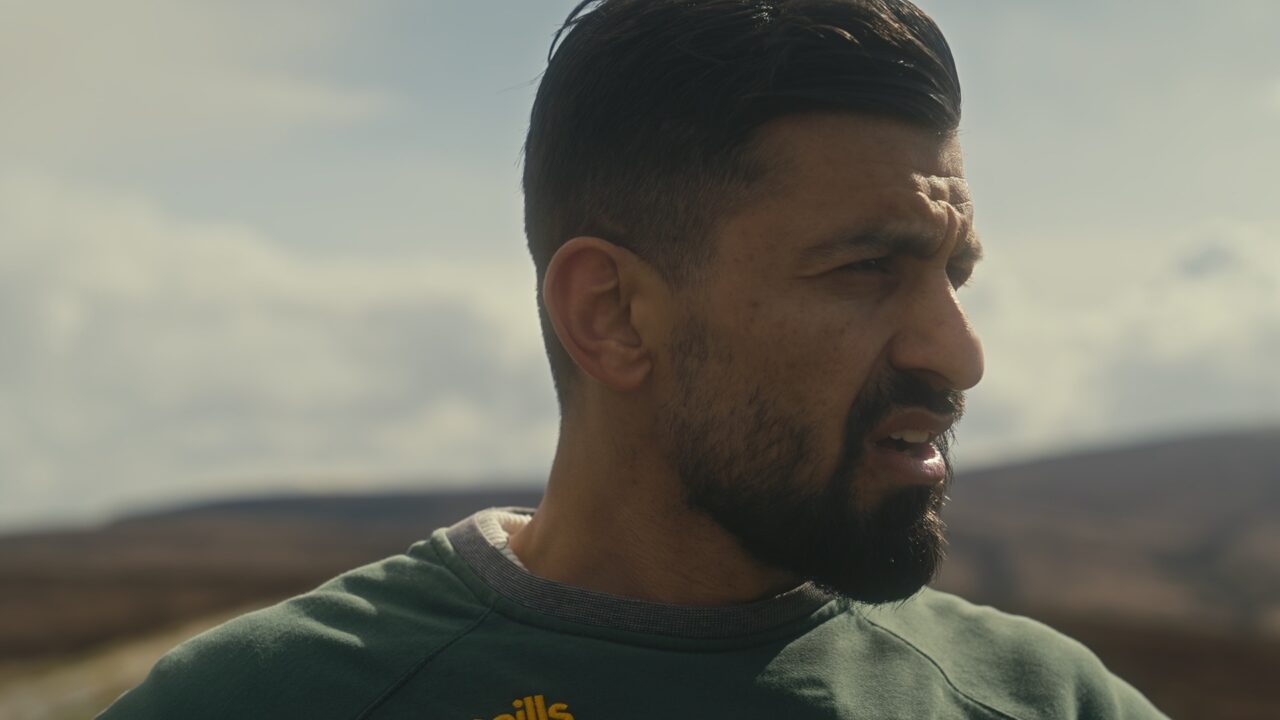Zak Moradi remembers that the idea for making a documentary about his life emerged from a conversation with the aviation entrepreneur Declan Ryan. Ryan had read the book Moradi wrote with the journalist Niall Kelly about his story, Life Begins in Leitrim. It chronicled how he grew up in a refugee camp in Ramadi, Iraq but ended up in Ireland playing hurling for his county and making a life here.
It is an inspirational and gritty story that talks about integration, the plight of refugees, multiculturalism and the power of sport.
Home: The Story of Zak Moradi sees the 33-year-old return to Kurdistan. There, he connects with his homeland and reflects on the journey of the refugee. The compelling documentary will launch at the Galway Film Fleadh on July 12.
“Declan was the main man behind the project,” Moradi said. “He was very interested in the book, and he thought there was a documentary in it.”
The One Foundation, Ryan’s philanthropic arm that has supported refugees and migrants in Ireland, Vietnam, Colombia, Jordan and elsewhere, funded the project. Trev Whelan came on board as a director with producers Will Rock and Ellen James.
Moradi and a film crew went to Kurdistan in March last year. It was his first time being in Kurdistan of Iraq, the Kurdish-populated area of Northern Iraq, one of four countries across which his people’s homeland stretches.
It was a life-altering trip for Moradi. “I’d only seen this part of Kurdistan on TV, but now I could see the whole of Kurdistan. There was no war. The capital Erbil is like Dubai in places but then, on the other side, there are close to 1.1 million refugees from Syria, from Iraq, Kurdish Syrians as well. They are refugees in their homeland, that was the sad part.”

Moradi said he met many Kurdish people who were persecuted. Now living in vast camps, many of them became refugees after Turkey drove them from their homes in 2019. He said the chances of them returning were diminished as displaced Palestinians were now being settled in the city of Afrin in Northern Syria, which had been cleared of Kurdish people only five years earlier.
Moradi had visited Kurdistan of Iran in 2015, where his parents originally came from, but this was his first time back in Kurdistan of Iraq where many of his family now lived. “Because of the 1980 Iraq-Iran war, a lot of my relations ended up as refugees in Kurdistan of Iraq,” he explained.
“After 30 years, a lot of them now have Iraqi citizenship but it took a long time and they paid a lot of money, more than $100,000, to get an Iraqi passport. Before they had that, they didn’t have an identity.”
Moradi said he felt very sad seeing so many Kurds living as refugees. “The Kurdish have no friends but the mountains because they are the only ones who never betrayed us,” he said.
Moradi himself was born in a refugee camp in Ramadi, a city in central Iraq. He said back then the city was a stronghold of former Iraqi dictator Saddam Hussein.
On his recent trip to Kurdistan of Iraq, he met many people who had once lived good lives in Ramadi as they were in relative favour under Hussein. Later they were forced to become refugees after Isis took over the area.
“We were suffering before, and now they’re suffering,” he said. “It is a mess. You just don’t know when you might become a refugee. Nobody wants to be a refugee. You don’t choose to be a refugee.
“My family lived like homeless people in Ramadi for 20 years. We were in mud houses; it was horrible but it just shows the ship changes very quickly because of war.”
Moradi said the documentary had brought home to him how easily things can be lost, as well as how much Kurdish people have contributed to the world. “It was an amazing trip,” he said. “I saw what Kurdish people have been fighting for over the last 100 years and I saw how much we’ve sacrificed.”
He said 25,000 Kurdish people lost their lives fighting Isis when others were afraid or not prepared to. “We were not only fighting for Kurdistan there, but also the world,” he said.
Moradi said large numbers of Kurds were now refugees in Europe, but if there was an independent Kurdistan they would not have to leave. “You would not have Kurdish people fleeing their homes to go to Europe because of persecution, genocide and ethnic cleansing,” he said.
Moradi said he learned more about this persecution for the documentary and had visited Halabja, where a chemical attack killed more than 5,000 Kurdish people in 1988 towards the end of Iraq-Iran war.
He met two survivors of the attack who had lost all their family in the massacre. “They were the only ones who survived,” he said. “It’s very sad.”
War and politics
Moradi said there was a double standard in the world where the loss of all lives was not treated the same. He said many Kurds had been killed by the Turkish government with little international condemnation. “I didn’t see the same noise from Irish politicians as they make for Palestine now,” he said, adding that the loss of all lives should be condemned equally by the international community.
Zak Moradi hopes that the documentary will educate viewers about the Kurds and their history, and said he hoped it would also show how refugees contribute to Irish society.
“I came here with nothing – from playing football in my bare feet in a refugee camp to arriving in Ireland, getting involved in sport and doing well. People say when you die, you go to heaven, but I’m already in heaven. I’ve been lucky,” he said.

While the documentary explores how the lives of many of his family had changed over 44 years, it also shows how the challenges facing others had not. People were now living as refugees for generations, Moradi said.
“There is still a refugee camp where we came from,” he said, adding that he had met cousins on his visit who were still refugees after so many decades. “It is mad. They can’t get an Iraqi passport.”
Moradi said one of his relatives had played soccer for Iraq and the support its football team achieved from everyone there showed the ability of sport to transcend differences. He said the Middle East was very multicultural, and this should be its strength.
“We have all these people who have lived side by side for thousands of years,” he said. “But war and politics divide them. That was the saddest thing I saw in the Middle East.”
Culture and identity
Zak Moradi said living and growing up in Ireland had shown him how brilliantly Irish people told their stories around the world. “Kurds always think there is something like 200 million Irish people rather than just five million,” he said. “I felt I wanted to tell people the Kurdish story. It’s a lot about our culture, our identity. It is an emotional documentary, but it has a happy ending.”
“Kurdish people and Irish people have had the same history because of colonisation and persecution going back hundreds of years.
“Irish people love drinking tea and having the craic and a bit of banter. They love listening to and playing music. We have a lot of that in Kurdistan too. Irish people love rebel songs and ballads and we have that too because of the same history of occupation.”
To his surprise, Moradi said he discovered there were Irish bars in Kurdistan. “There was an Irish bar in the hotel we stayed in so we had a pint there.”

He said the economy was getting stronger in his homeland, which was undergoing a building boom. “People are going there. There’s peace after the wars,” he said. “There are American, British and Chinese tourists there now. I never thought I’d see that.
“A lot of the Irish crew who went over there couldn’t believe what they were seeing. Kurdistan has a lot of beautiful mountains. It is surrounded by mountains and between the four different parts there are close to 40 to 50 million people.”
In his biography Life Begins in Leitrim, Moradi explains how the GAA played a powerful role in his life and helped with his integration into Irish life. Sport is also a theme in the documentary.
Moradi said he felt the documentary had particular relevance as refugees come under attack from extremists in Ireland. “We need to give people a chance,” he said. “There are a lot of people in the world fleeing because of persecution. We just need to treat everybody equally.”


